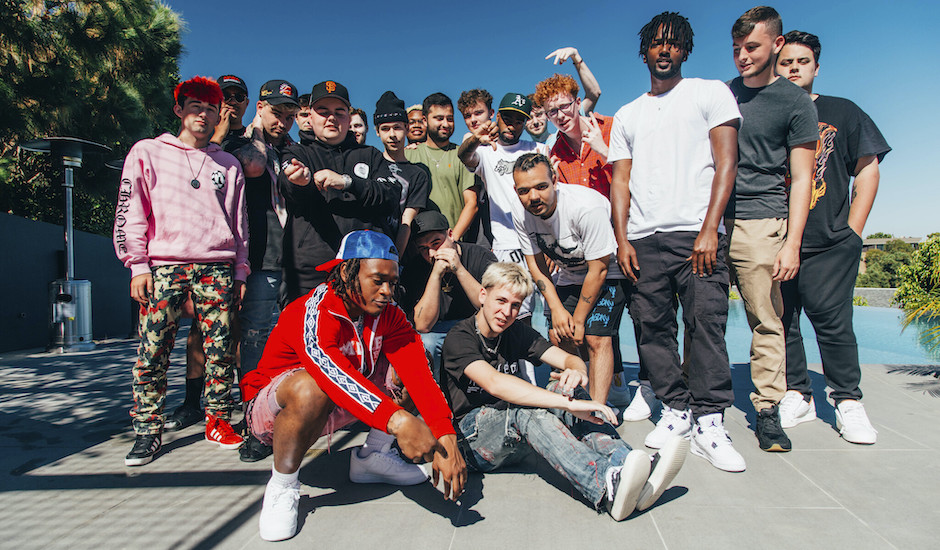 Introducing Tayo Sound: UK street busker, vision of the futureIt’s been a big two years for Reading teen Tayo Oyekan, who’s gone from hustling neighbourhood busker to international recording artist.
Introducing Tayo Sound: UK street busker, vision of the futureIt’s been a big two years for Reading teen Tayo Oyekan, who’s gone from hustling neighbourhood busker to international recording artist.

The storm of Internet Money, hip-hop’s chart-topping collective
They’ve shaped the past and defined the present, but with their debut album B4 The Storm, hip-hop’s most powerful production posse are angling for the future.
In a way, ‘Internet Money’ just about sums it up.
It’s the kind of wired-in origin story that befits a cutting edge production posse: Jacksonville teen Danny Snodgrass Jr, having dropped out of school, steps up to help in the face of his mother’s cancer diagnosis. Options admittedly limited, Danny remembered his musical past – time spent with his musician father had sparked an interest in drums and guitar, but the flame had long since flagged. Most people don’t see the music industry as a solid contingency plan, but luckily, Danny isn’t most people.
“I had to sell everything I had in my room on Craigslist, just to be able to buy a Dell laptop to make beats with shitty speakers,” Danny tells me from his sheet-white home office somewhere in Los Angeles. “I remember making my first beat, and being so enthusiastic to get back into music because I have a background in music,” he continues, “and then people were just shitting on me and being like, ‘bro, nah, this sucks don't ever make another beat again, this is trash, what are you doing… go die.’” He laughs at that last one, the malice even more absurd a decade on. “I just kept going.”
That’s putting it lightly. Taking on a risk-reward ratio that’d make Walter White sweat, Danny adopted the mantle of Taz Taylor, a tight, alliterative credit with a cadence befitting a deft musician, and started selling his work online. Using a novel approach to licensing instrumentals, Taz waded into the fledgling ‘type beat’ economy, and whilst detractors savaged and disciples studied, the Jacksonville teen worked his way to $500,000 a year, all off music.
His online business model found both customers and peers, and rapports with those fellow producers gave Taz a deeper understanding of their mutual challenges. He earned some placements and, after seeing the seedy side of the music industry firsthand, took that idea to its natural end. In 2015, he founded Internet Money. If it’s already steeped in those 21st-century spoils, Internet Money also runs with the multifaceted approach of other raised-by-the-internet collectives, conceived as a producer’s union, housed in a huge co-living mansion, host to production boot camps and home to a revolving door of talent. Names such as Nick Mira, SIDEPCE, E-Trou, pharoahvice and Rio Leyva proved indispensable. The credits started piling up, the plaques started coming in, and in 2018, Internet Money became a label in its own right.
If the name Internet Money does something to distill those origins, ‘debut album’ betrays their experience, framing this moment as some sort of arrival. “Even before we were a label, we wanted to do an Internet Money album, but I just felt like we were really premature,” admits Taz, that tactical take well-suited to the home office surrounds. “The timing was never right, and we could never get the right people to believe in this album.” The idea itself has been floating around since at least 2018, when Free Greedo, a collaboration with Mozzy and still-imprisoned Watts emcee 03 Greedo, became the first to bear the collective’s name, but it wasn’t until 2019’s Somebody that the pieces started to fall into place. “I feel like if we were gonna put out an Internet Money album before, we wouldn't be able to have this much of an impact,” supposes Taz. “We finally got all the songs we wanted, and we got all the artists we wanted to be on there.”
That process, like everything else that Internet Money does, was a little different: shelved songs were scrapped for parts, with elements like hooks, verses and melodies broken down to their most fundamental forms. Those virtual crates are as deep as they are prestigious, with Taz and Nick producing hits such Lil Tecca’s Ransom together. They’ve got credits in their own right, too: Nick’s rapport with JuiceWRLD saw him produce most of Goodbye and Good Riddance, including All Girls Are The Same and Lucid Dreams, and Taz has had a hand in hits from Trevor Daniel, Rich the Kid and Drake. That’s without even counting the rest of the Internet Money team. There’s no telling how deep they roll, but in 2018 alone, the then 15-strong crew earned 2 GRAMMY nods, 24 Platinum plaques, 16 Gold accreditations, and 5 Billboard number ones. Digging in the Internet Money crates isn’t just panning for gold – it’s exhuming nuggets.
“We thought they were a 10 back in the day, but it was really just like the songwriting and the hook,” explains Taz, diving into the process behind second single Lemonade. “Don didn't care about it, it was a throwaway record that we took and I was like ‘yo, this is fire, yeah! Let's do this! I forgot about this!’” More than just a brisk remaster or bonus track, Internet Money producers Alec Wigdahl, E Trou and pharaohvice joined Nick and Taz to push that dusty leftover into the cultural moment. “It sounds new, you know what I mean? It sounds like it was cut like last month, you'd have no idea,” he says, the chart success proof enough. “I mean, for Gunna and Nav it was, but Don did it in 2018 and we did the song in 2017.” Taz thinks a second, then lands on a distant memory. “We made Lemonade on October 7, 2017.”
Whether off the dome or recently recalled, it’s that kind of intimate knowledge that makes Taz the one-man front of this much larger outfit. “A lot of people in Internet Money deserve like a fucking Purple Heart, because I'm just a madman to work with bro,” he admits, rattling off holidays, weekends and special occasions spent in-studio. “When we moved into the old house around November, we really didn't leave the house until like February anyways, so we were already like Corona-ed down.”
Internet Money’s co-living model, which has now moved to another Los Angeles manor, allows for that kind of perpetual grind. You’re almost certain to find somebody working on something at any given hour, whether downstairs in the studios, upstairs in their bedrooms or out in the shared living room. It’s a model for productivity that relies on interpersonal bonds, and unlike many approaches, it’s remarkably COVID proof. “I looked at it like this: we could sit back and wait for seven months for everything to come back to normal, which it still hasn't; or we could just say fuck it, let's go all out, and just do every session,” he waxes, compelling. “Let's put together records! Let's take old records, let's go get old verses and just start working on them ourselves.”
B4 The Storm, which features seventeen of those refurbished records, is a dense display of the styles that Internet Money has helped champion over the last few years. The album’s 23 features cut across 17 tracks, running the gamut from fresh-faced teenagers like Lil Tecca and Lil Mosey to storied vets such as Future and Wiz Khalifa. On Giddy Up, Wiz and 24kGoldn – XXL Freshmen a decade removed – work to fuse blog era bars and TikTok trends with a catchy slice of melodic hip-hop. “I think on this album, the only thing there is to prove is the fact that we could just pull together artists and they sound perfect next to each other,” explains Taz of the deliberate bid for variety. “What's crazy is, no artists cut the shit in the same studio with each other.”
Those independent verses and punched-in vocals opened up the mix-and-match possibilities, which Taz describes as “new kids mixed with the older people that I grew up listening to.” He fawns over Kevin Gates, whose spot-on incisive solo cut No Option reunites Taz with the man behind his very first production placement. “When I was riding around in my mom's car with no license for four years, I was listening to every Kevin Gates song,” he says with a laugh. “The fact that I could have Kevin Gates on my album… what are you talking about, I'm freaking out!” Those familiar faces are more than just dream collaborators or grizzled foils, and Taz explains their addition as both a frame of reference and an act of reverence. “They're artists that kids in the next generation should be very hip to and understand, because Wiz Khalifa and Kevin Gates and Future and even Swae Lee, they influenced so many of the new artists.”
As Taz runs through some inspirations of his own – prominent, starring-role producers such as Dr. Dre, Kanye West and, in a sense, DJ Khaled – it becomes clear that there’s one strain of influence that doesn’t show on B4 The Storm. “I feel like it's something that producers got out of a couple of years ago,” he says at the first mention of sampling, a cornerstone of hip-hop that’s since been stifled by litigation. Taz talks of “artists getting fucked over from all these old bands that don't even respect rap music, so they don't want somebody to dirty their music,” the disdain both personal and professional. “We got tired of dealing with it.” He’d much sooner cut in another producer, especially those who make “better samples than the old vinyl records,” than mess with “some artist that wants 85% of something that isn't even a fucking sample.”
That specific number calls back to Internet Money’s run-in with Sting, whose notoriously hardcore terms and conditions saw him allegedly take 85% of profits from the Shape Of My Heart-interpolating Lucid Dreams. Though Sting himself has vaguely contested the charge, it’s certainly not out of character: in 1997, he snapped up 100% of the profits to Puff Daddy’s I’ll Be Missing You, which sampled The Police’s Every Breath You Take. In an even harsher twist, guitarist Andy Summers – the only Police member actually heard on Puff’s dedication – was not credited as a writer, and therefore gets the same rate as Puff. “They're just like, ‘appreciate you for putting my grandkids through college,’” vents Taz, righteously indignant. “It's just disrespectful to music.”

The aversion to sampling, underwritten by some dodgy dealings, only pushes Taz closer to the artists he most admires: the producers themselves. That’s not to say that Taz hasn’t found that industry machiavellianism behind the boards, and he elaborates on Khalid’s Location, the titanic 2017 hit that used one of his loops without as much as a credit. “I just remember all the producers and people that… didn't do things how I would do things,” he begins, words deliberate and considered. “If anything, I look at it like a lesson bro, because we were able to sit there and I learned how cutthroat the industry is… producers be talking about, ‘we got to come together and we need to start a union,’ but they'd be the same motherfuckers in the emails talking about ‘nah, we ain't doing that, fuck them!’”
If anything, these conflicts gave Taz a point of reference, something against which he can define his own business model. “One thing I will say about Internet Money that no one realizes is we do fair business,” he proudly explains. “If someone does a hi-hat on the song and then someone else makes the rest of the beat, they get equal splits. We don't care that much.” It reads like a fairly radical take on equity, one that stresses the communal talents of Internet Money over any beat-based auteurism. If that approach encourages collaboration, emboldens fresh producers and stokes consistency, it leans heavily on the interpersonal relationships that comprise Internet Money, fickle variables that number in the hundreds. Taz keeps it focused with a simple truth: “a small percent of a big amount is still a large amount of fucking money.”
That’s the kind of fleeting aside that would’ve been unimaginable even just five years ago, when producing was a solitary grind in his small Floridian bedroom. “I don't even feel like I live that life anymore,” he says a decade on from those Jacksonville beginnings, “I was really immature and childish, I didn't understand life.” Somewhere on the way to his production collective, record label, LA-based mansion home and the countless plaques that line the walls, Taz figured it out. “People think like everybody's a 17-year-old kid, [but] there are people in Internet Money who are older than me,” he explains, mentioning the other parents working with Internet Money. “I think it just puts everything in perspective: at the end of the day, they see me going so hard for my son and making sure that everything's taken care of for him, that's where they realize ‘damn, I can really do this from music,’ you know what I mean?”
Having gone from Jacksonville teen and rap game bête noire to the hitmaking head of a prospering professional family, Taz Taylor and Internet Money have nothing left to prove. If anything, Taz seems to be musing over mentorship, inspiring producers from afar and instructing those he can get to the house. “I just want to see producers do more artists projects and more labels and everything,” he says enthusiastically, “I'm just tryna help pave the way like Khaled did, like Dr. Dre did, like all these other producers.” The path he’s looking to pave runs from the winding boulevards of the LA hills to the humble streets of Jacksonville, his hometown nearby no matter the distance. “I want to do it in Jacksonville, places for kids to go and learn music or just kick it, because where I was from, there's like nothing,” he says, serious and eager all at once. “It's a different lifestyle in Jacksonville and I would just love to start building, get on the ground there, and start doing stuff to change that community around.”
It’s somewhere near the top of a long, ever-growing list – “the Internet Money eSports team” is mentioned, “legit Internet Money weed” is in the works, and “a real creative space,” inspired by Brian Wilson’s famed Pet Sounds sessions, might just come to pass. B4 The Storm is but another rung on the ladder to the top, and whilst there’s no telling what’s coming next, one thing’s for sure: it’ll be sooner than you think.
Internet Money's debut album, B4 The Storm, is out now via 10K Projects / Internet Money Records / Caroline Australia.
 Introducing Tayo Sound: UK street busker, vision of the futureIt’s been a big two years for Reading teen Tayo Oyekan, who’s gone from hustling neighbourhood busker to international recording artist.
Introducing Tayo Sound: UK street busker, vision of the futureIt’s been a big two years for Reading teen Tayo Oyekan, who’s gone from hustling neighbourhood busker to international recording artist.
 The graceful maturation of San Cisco: “We’re getting old.”As they reach into their 30s, San Cisco are growing up, and their new record Between You and Me shows how to do it gracefully.
The graceful maturation of San Cisco: “We’re getting old.”As they reach into their 30s, San Cisco are growing up, and their new record Between You and Me shows how to do it gracefully.